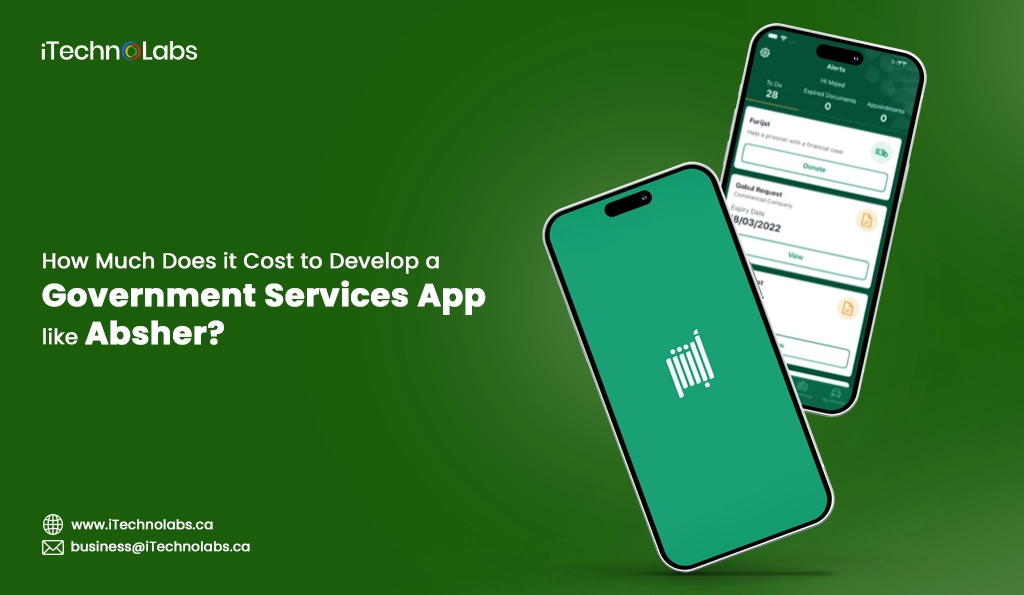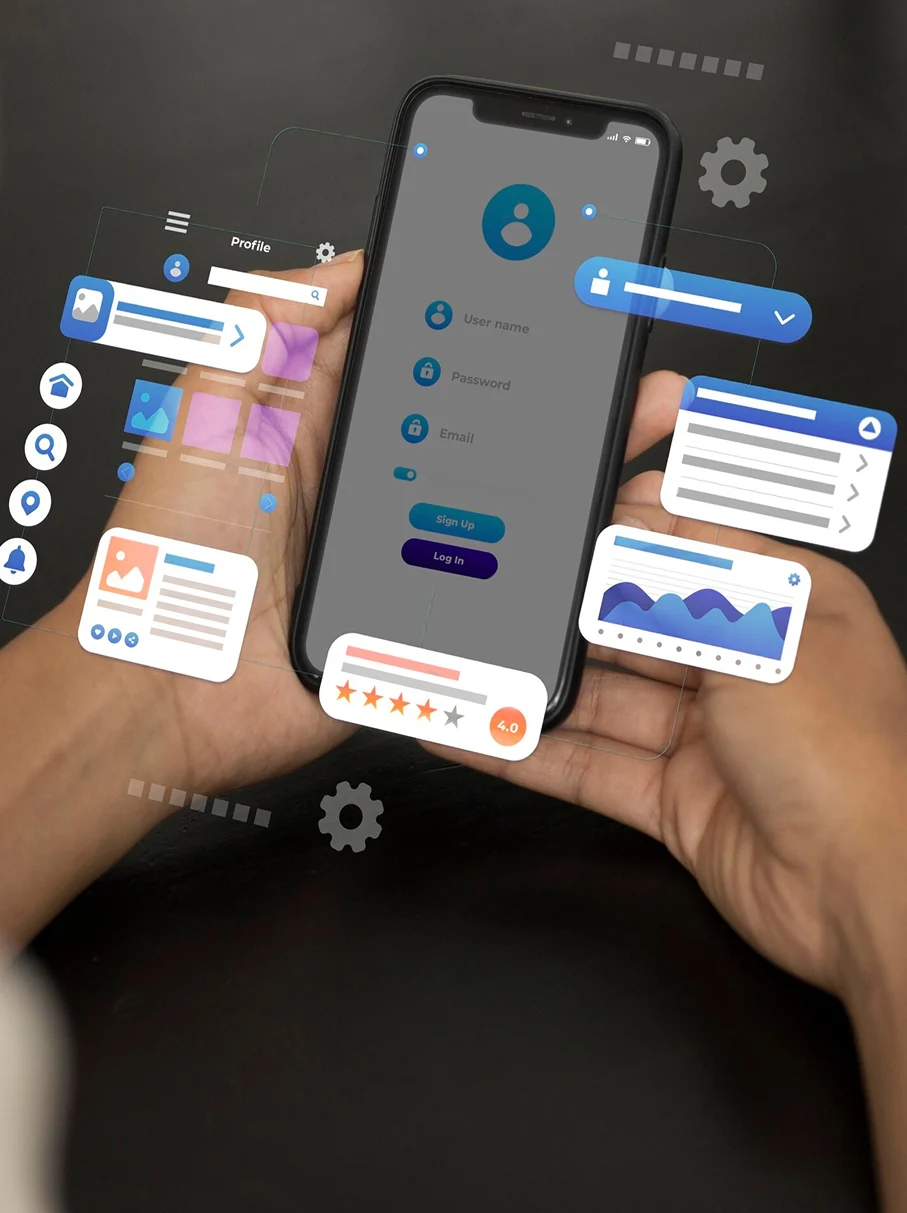Today, government apps have made it easy to renew licenses, pay fines, or apply for documents without stepping into a government office. Over 70% of governments worldwide now offer mobile apps to make services faster and more citizen-friendly (Source: UN E-Government Survey 2022). These apps also help governments cut service costs by 20–30% (Source: OECD Digital Government Report). One good example is a Government Services App like Absher in Saudi Arabia, which brings dozens of services under one app. Countries with strong digital services also see 25% higher citizen satisfaction
Absher (Saudi Arabia) crossed 27 million active users in early 2025, offering 350+ integrated services (Saudi Ministry of Interior, 2025).
Absher is an ideal example of how mobile apps can change how people interact with state services. Absher was launched in 2010 and was built with a single goal: to make state services easier for both citizens and residents of Saudi Arabia. Fast forward to today, this Government Services App like Absher, offers access to around 300 services and serves more than 23 million users. Whether it’s renewing your ID, applying for a visa, reporting a lost item, or checking traffic violations, users can do it all from their phones.
The app isn’t tied to just one department either. It pulls services from multiple government sectors like Civil Affairs, Traffic, and Public Security. This saves users from the headache of visiting multiple offices or dealing with long queues. It shows how smart integration can make a huge difference when designing a government services app.
Now, if you’re planning to build an app like Absher, you’ll need proper consultation and a strong development team. Many people ask about the cost. Based on market standards, building a government app like Absher can cost anywhere between $30,000 and $30,000–$250,000 (SAR 112,000–930,000)—depending on how many features you want, what tech you use, and the level of security required.
“Every government is a digital government, and every citizen is a digital citizen. Technology is no longer optional; it is fundamental to service delivery.” – Satya Nadella, Microsoft, 2025 Keynote on AI & GovTech
In this article, we’ll break down all the major factors that impact the cost to develop a government services app. If you’re thinking about launching a similar app, this guide will give you a clear view of what it takes and what to expect.
Must-have Features in an App like Absher
Using an app like the Absher should be safe and secure. Features such as fingerprint login, real-time alerts, and secure payment options are one. A clean dashboard that organizes all services can clearly save users from being confused. Quick customer support inside the app also makes a big difference. Without these basics, users will quickly lose trust and drop off.
Personal Profile Management
A Government Services App like Absher should focus on simplifying the user experience from profile creation to management. This involves having a straightforward way to enter basic information, such as full name, home address, phone number, and email address, to create their profile.
From that point, the app should allow users to upload sensitive information, like government identification numbers and recent pictures, to provide more authority and verification. This ensures that all essential details are collected initially, and from there, a Government Services App like Absher can provide users with a more trusted and seamless experience, assisting them in accessing services with little to no friction.
Government Services Integration
Absher’s real strength comes from how well it connects with different government databases. Instead of users jumping from one department to another or waiting in long queues, everything should be available through the app itself. To function evenly, Absher requires solid, safe systems that talk to different real-time departments. A strong backend not only provides users accurate, up-to-date information but also speeds up government processes that make public services more efficient and transparent.
Digital ID and Documents
Absher should let users store all their important documents digitally. Think ID cards, passports, and driver’s licenses all saved safely inside the app. No need to carry bulky files anymore. Whenever users need to show a document, they can pull it up instantly. Plus, it reduces the risk of losing physical papers or dealing with fake copies.
User Authentication and Security
Security should not be an afterthought for an app like Absher. It should contain robust authentication options, such as two-factor login or biometric options like fingerprint scanning or face recognition, to protect user accounts. Above and beyond, it should make use of encrypted connections to resolve the privacy of user data while being transferred. To stay current on states of security, regular audits of app systems, updates on security, and running tests that simulate attacks on the system to identify or even improve aspects that are weak are needed. By being proactive, Absher is able to create real trust and goodwill with its users and remove their information from threats.
Language and Accessibility Options
Absher has the potential to be inclusive for all users. Offering a range of languages for people from different backgrounds is a pretty simple workaround. For ability users, it should come with voice commands, screen readers, and easy-to-use navigation controls. There are a couple of friendly things we can do here to make Absher more accessible and prevent anyone from feeling isolated when trying to get online services.
Visa Services Integration
As Saudi Arabia opens its doors to more tourists and expatriates, the addition of visa services to Absher would be a true differentiator. The average user should be able to submit the visa application, track his position, receive the visa approval, and complete the entire process without going to the Government Office. By integrating visa services with Absher, it will save time and anxiety and will provide a more welcome experience for international visitors as a whole.
Electronic Crime Reporting
Because of the current epidemic of cybercrime, users should also be able to quickly and easily report internet crime or suspicious activity in Absher. Rather than spend time trying to find the right person or authority to offer their information to during an emergency, users should simply log an e-crime report in Absher. In this way, authorities will be able to act quickly, and users will feel empowered and safe in the online environment which will help to make the internet a safer place for every one of us.
Service Status Tracking
Absher should also be user-friendly and allow users to check on the status of submitted services or applications, such as visa applications and residence permits or license renewals. Real-time status updates would allow users to plan effectively versus following up or wasting time making extra visits to government offices. Citizens will feel far less stress and are less likely to be frustrated when they know where they stand.
Resident Permit Services for Non-Saudis
Absher shouldn’t just focus on citizens, it should also make life easier for expats. From renewing residence permits to checking expiry dates, everything should be doable through the app. This saves non-Saudis from visiting offices in person and helps them avoid late penalties by staying informed about their legal status.
Job Services
Absher can play a bigger role by supporting employment too. Through the app, users should be able to search for government jobs, apply online, and even track applications. Employers, on the other hand, can check their “Nitaqat Status” to see how well they’re following Saudi employment rules. This two-way support promotes local hiring and makes job hunting—and hiring a lot more efficient.
Offline Access
Not everyone has internet access 24/7. That’s why Absher should offer offline options. Users could download documents or key info onto their devices and access them with no Wi-Fi needed. Plus, customer support and a dedicated call center should be available for users who prefer personal assistance. It’s about being accessible, no matter the situation.
Analytics and Reporting
For organizations and government agencies, a Government Services App like Absher should also provide an appropriate dashboard to help them track their service requests (e.g., visa renewals or work permits) that they have initiated, since they could potentially have several people wanting their service multiple times.
Having access to real-time information may make it easier for organizations to stay on top of their requests, and for people who use a Government Services App like Absher to routinely access service feedback from service requests via analytics, which allows government departments to identify gaps and improve services more quickly.
80% of governments worldwide now provide some form of mobile-based e-government services (UN E-Government Survey 2024).
Suggested article: How to Create a Cross-Platform Stock Trading App Using Flutter
Factors Influencing the Development Cost to Build An App Like Absher
There must be some costs in initiating and maintaining an app for the government, such as Absher. The government often absorbs the costs, but the overall investments may increase over time. As user counts increase and the demand for security grows, maintenance, upgrades and changes are needed. Implementing new features, improving speed, and ensuring data remains secure involve ongoing expenditures. Technology is evolving rapidly, and government applications need to evolve; otherwise, they become irrelevant. Therefore, the cost in terms of IT for the service is going to change over time – not just a one-off cost.
Technology Stack
Technology moves fast—and Absher has to keep up. This means regularly adopting new programming languages, updated frameworks, and stronger infrastructure solutions. These upgrades are necessary to keep the platform reliable, fast, and scalable. But every tech upgrade comes with a price tag—training teams on new systems, investing in modern tools, and spending more time to test and optimize the new technologies. It’s all part of making sure Absher runs better, but it does push the costs higher.
Design and User Experience
Today’s users want applications that are quick, easy and effective to use; Absher is no different. Meeting a user’s current-day demands requires constant interrogation into those demands and therefore ongoing improvements to the overall design and usability of every individual app. Delivering a usable and accessible application requires UX designers, usability testing and ongoing design updates. While these endeavors are all helping the overall satisfaction of the user, they all add to the total development and ongoing maintenance costs.
Integration With Government Systems
Absher is not just an app – it is a connection for citizens to dozens of government services. Each integration has additional planning, development work, and ongoing maintenance. Absher has good connections with various government back-end systems regarding health, education, finance, and law enforcement – but connection matters, and the psychology of social contract agreements requires the companies and information systems to jubilantly integrate!
Security and Data Privacy
For Absher, security is non-negotiable. As a provider of highly sensitive data, the platform must have robust security against cyber threats. This means investing in security technology, obtaining cybersecurity human capital, and auditing and updating to meet privacy legislation. While these processes often come with significant costs, it is essential to maintain user trust while avoiding larger risks later.
Platform Compatibility
Absher should work seamlessly whether you are using a laptop, a mobile phone, or a tablet. Developers need to test the platform throughout all devices, different screen sizes, and operating systems – making this a time-consuming effort with lots of resources and continuous coordination to resolve unforeseen compatibility problems. However, making the platform usable for everyone isn’t just nice—it ensures that no citizen is left behind, regardless of the device, unless it is old and non-compatible.
Testing and Quality Assurance
Absher is used by millions, so bugs and glitches are not simply a nuisance. There are serious rounds of testing that are undertaken before any updates are released to the system. It is not simply making sure that the app operates; Absher has obligations for user data storage and cyberattack mitigation, and the app must be almost fail-proof. For all of these reasons, Absher runs regular vulnerability assessments, penetration tests, and code reviews. All these quality assurance activities are continuous expenditures, but it is the only way to have a generally stable platform that allows users to have the level of trust they can place in services like Absher.
Maintenance and Updates
And this process doesn’t end after launch. The Absher platform needs routine maintenance as it continues to fix bugs, add features, maintain compliance with new technology standards, and stay in front of developing security issues. A dedicated support and enhancement team will be diligently working behind the scenes to ensure the reliability and efficiency of Absher.
App Development Process To Create An App Like Absher
It is important to note that just because it is done does not mean that Absher is finished processing its application. Building a mobile app like Absher, or any application for that matter, is not a one-shot idea. The “programming” aspects of building a mobile app can be broken down into stages, and those stages are; Plan, Design, Development, Test, and Deploy. These stages are collectively called the Software Development Life Cycle (SDLC) and each stage of the SDLC is critical to ensuring you are producing an application that is operational, perhaps provides a good user experience, and is generally compliant with what the application is intending to do for its users.
Project Initiation and Planning
Every application starts from an idea, but that’s not enough! You have to plan before you develop. Project initiation is the first step of building an app and is where the team works out what they are actually building. They define the intended goals of the app, examine the needs of the end user, and write down the must-have features for an MVP (minimum viable product). After the intention is clear, it enters the planning phase. The planning phase is where team members create the plan, including everything that is required, the estimated timeline, and identified resources. Planning thoroughly in the planning phase can conserve time, minimize mistakes, and keep the project on track from the very beginning.
Design the Frontend and Backend
Once the planning is done, it’s time to design how the Government Services App like Absher looks and how it works behind the scenes. The frontend is the part where users see the screens, buttons, forms, and the overall flow of the app. A good UI (User Interface) makes the app easy to navigate and enjoyable to use.
The backend is the engine room. The development stage is where databases, servers, APIs, etc. come into play for managing data and the application’s functionality. This is also the stage where designers and developers collaborate closely to ensure that the Government Services App like Absher is pleasant for the user and works wonderfully as well, especially when the app has thousands or even millions of users.
Deployment and Launch
After development and testing are done, the app is ready for the real world. Deployment means putting the app live—either on cloud servers, government systems, or app stores like Google Play and the Apple App Store. Before the app goes live, it is tested thoroughly to find any last bugs or performance issues. If everything is working smoothly, it is time to release the app. The app launch isn’t a passive event. A big part of the launch is driving attention through websites, social media and campaigns to get users aware of it and to get them using it. A well-planned launch creates excitement and builds trust instantly.
Also Read: Zillow API Cost
How much does it cost to develop a government services app?
- The cost of developing a Government Services App like Absher can vary – it all depends on how simple or complex you want the app to be. A simple Government Services App that has some features and a basic level of design can be priced between $50,000 and $100,000. An app that has advanced features like a fingerprint or face ID for login, several deferred data updates, and a direct link to different departments could prove to have costs that rise quickly and easily exceed $200,000.You should also factor in the costs to ensure the Government Services App like Absher will function when the launch date arrives. This will include things such as ongoing support, determining updates and necessary changes, providing security patches, and ensuring that the app meets all the latest government privacy requirements. These costs build over time. It is good to plan your budget for a Government Services App like Absher for the long term and not just when you are planning to launch.
Type of Application Estimated Cost Range Notes Basic Application (Minimal Features) $50,000 – $100,000 Covers essential functionality and simple UI. Intermediate Application (Moderate Features) $100,000 – $150,000 Includes more complex workflows, integrations, and improved UI/UX. Complex Application (Advanced Features) $200,000+ Advanced features, scalability, AI/ML, or multi-platform capabilities. Ongoing Maintenance & Updates Varied (depends on complexity) Regular updates, bug fixes, server costs, and new feature enhancements. Compliance with Government Security Standards Extra (country-specific) May require certifications, audits, or additional security infrastructure.
Conclusion
Building a Government Services App like Absher is an excellent way of improving the speed, simplicity, and transparency of public services; however, don’t forget to carefully consider the overall cost involved. A basic app may start around $50,000, whereas a desirable and complex platform with password-protected log-ins, users able to track the real-time status of their application, and standard APIs for integrated services can explode to over $200,000. You will also need to factor in costs for continuous maintenance as well as security updates and meeting compliance issues related to a government service. In conclusion, a good app will not only help citizens access services, it can save the agency time, save operational costs, and aid in fostering public confidence and trust. So if you do plan on building one, define your goals, prioritize features, and future-proof your technology stack. The initial investment can mean the difference between an application that is simply there and one that fulfills its intended purpose.
FAQs
1. How to build a government services app like Absher?
To build an app like Absher, you first need a clear plan. List out the services you want to offer, like document renewals, fine payments, or visa tracking. Then hire a team of experienced developers who can design a secure, user-friendly platform. You’ll also need to set up connections with government databases, add strong security features, and test everything properly before launch.
2. How much does the Absher government services app cost?
The cost to build a government services app like Absher depends on how complex you want it to be. A basic version could cost between $50,000 and $100,000. But if you want advanced features like real-time updates, biometric login, and multi-language support, it can easily go over $200,000. Plus, you need to plan for yearly maintenance costs.
3. How long does it take to develop a government services app like Absher?
Building an app like Absher isn’t a quick job. On average, it can take 6 to 12 months, depending on the number of features, integrations, and testing involved. A simple app can be ready faster, but a full-featured platform with real-time updates, security layers, and smooth design needs careful planning and a longer timeline.
4. Are there any security concerns with government services apps?
Yes, security is a big concern. Apps like Absher deal with sensitive information like ID numbers, addresses, and personal documents. Without strong encryption, two-factor authentication, and regular security audits, there’s a risk of hacking or data leaks. That’s why building tight security into the app from day one is non-negotiable.










